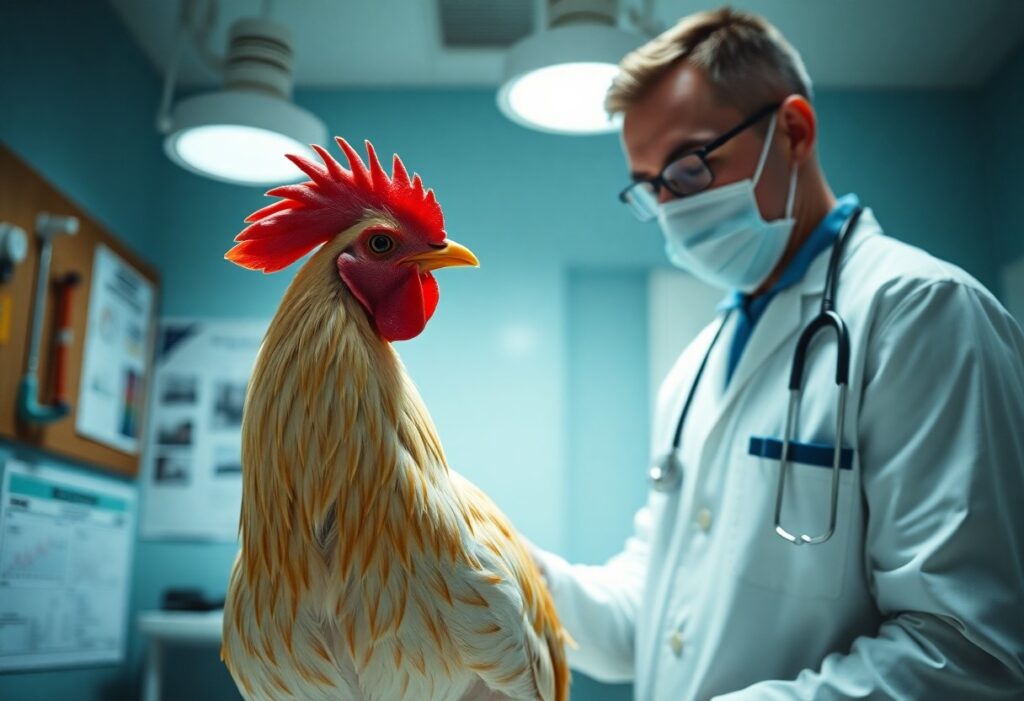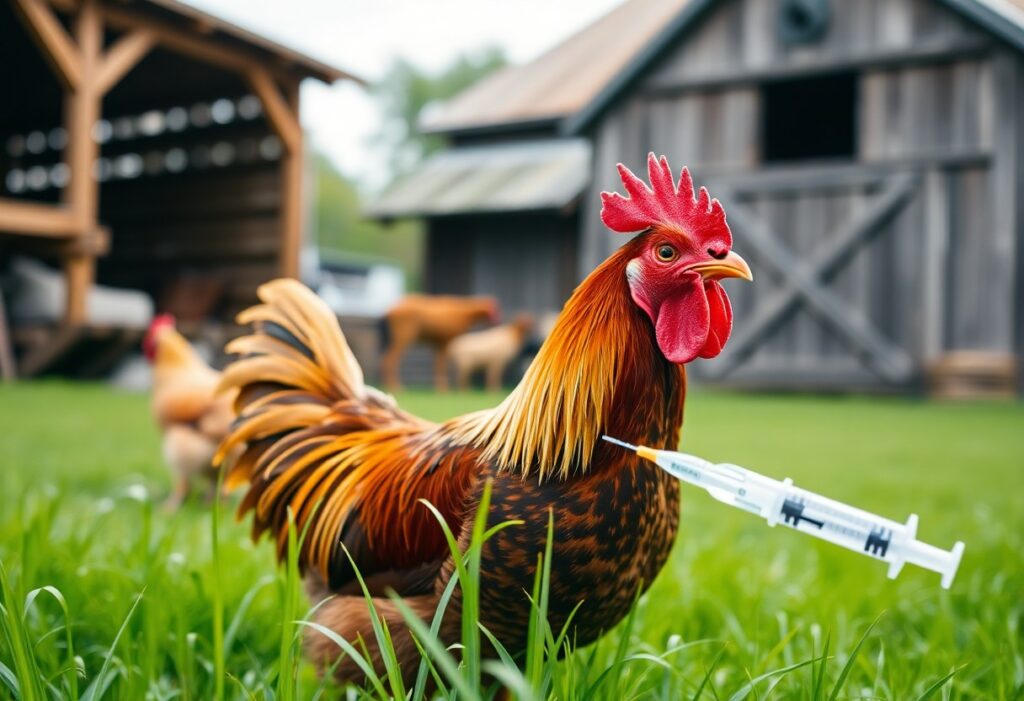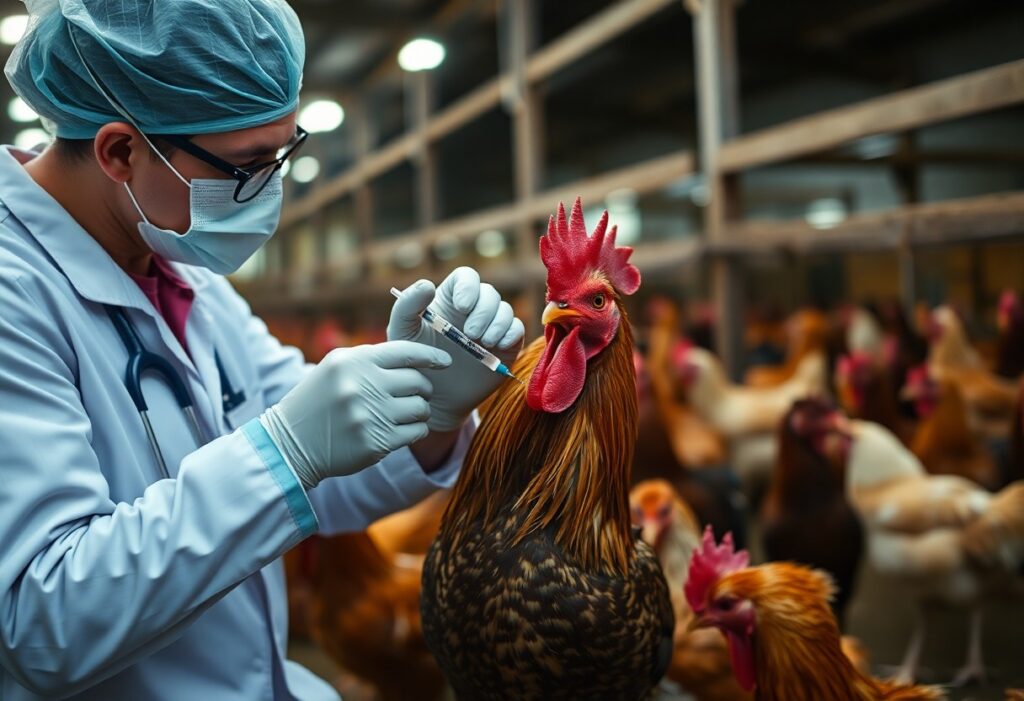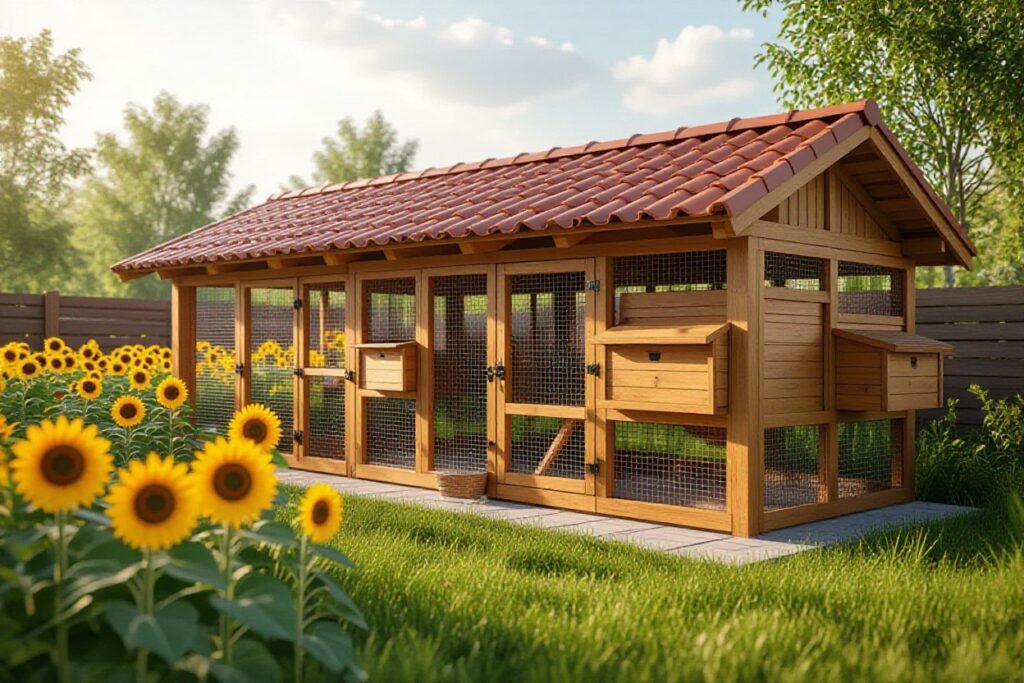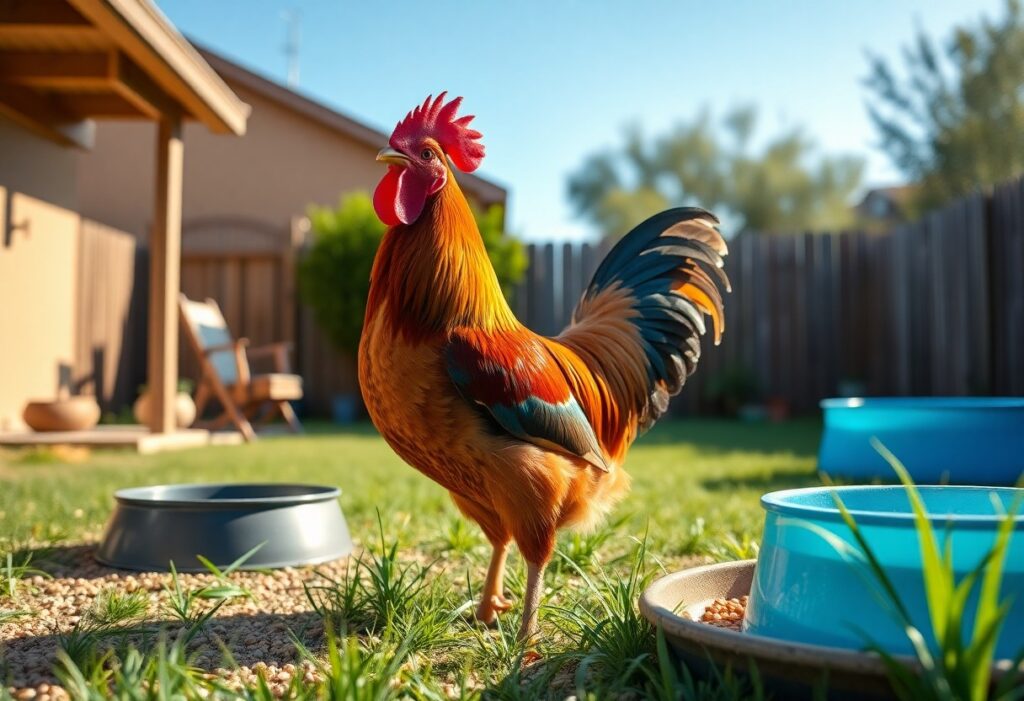Over time, ensuring the well-being of your rooster can dramatically impact not only its longevity but also the overall health of your flock. Regular health check-ups are important to identify potential issues early, allowing you to provide the best care possible. Understanding the signs of disease, maintaining a proper vaccination schedule, and monitoring behavior can make a significant difference in your rooster’s quality of life. This comprehensive guide will arm you with the knowledge needed to keep your feathered friend healthy and thriving.
Key Takeaways:
- Regular health check-ups for roosters help in early detection of potential health issues, ensuring prompt treatment and better overall wellbeing.
- Routine veterinary care includes vaccinations, parasite control, and nutritional assessments, all of which contribute to a more productive and healthier flock.
- Monitoring behavioral and physical changes during check-ups can provide insights into the flock’s environment and management practices, promoting long-term success in poultry care.
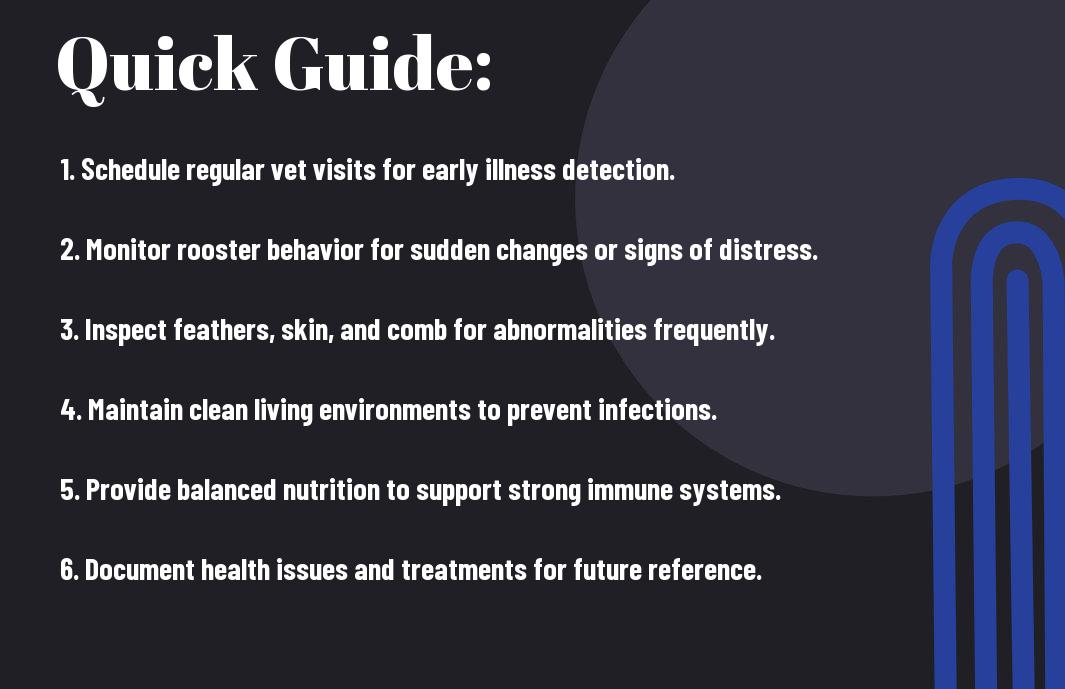
Types of Rooster Health Check-Ups
The types of health check-ups your rooster requires vary depending on age, breed, and overall health. Regular examinations are vital for early detection of issues. Consider the following categories:
| Routine Check-Ups | Regular physical examinations to monitor overall well-being. |
| Preventive Health Assessments | Assessments aimed at preventing disease and ensuring optimal health. |
| Nutritional Evaluations | Review of diet for necessary adjustments to boost health. |
| Behavioral Assessments | Monitoring behavior for signs of stress or illness. |
| Disease Screening | Testing for specific diseases that could affect your rooster. |
The types of check-ups you should provide will help you keep your rooster in peak condition.
Routine Check-Ups
Any good health regimen starts with routine check-ups, typically recommended once or twice a year. During these visits, a veterinarian will perform a thorough examination, looking for signs of illness and assessing overall condition. These check-ups help you address minor issues before they escalate, ensuring your rooster stays healthy and active.
Preventive Health Assessments
The goal of preventive health assessments is to catch potential problems before they develop into serious conditions. Regular assessments include vaccinations, parasite control, and health screenings tailored to your rooster’s needs.
Another key to your rooster’s longevity is engaging in preventive health assessments, which can be life-saving. Timely vaccinations protect against common diseases, while regular deworming helps fend off parasites that can cause significant health issues. This proactive approach enables you to maintain your rooster’s vitality, allowing you to enjoy the companionship for years to come.
The Importance Of Regular Rooster Health Check-Ups – A Comprehensive Guide
You can ensure your rooster’s well-being by following a structured approach to regular health check-ups. By systematically assessing various aspects of their health, you can identify potential issues early on. The following table outlines the step-by-step guide to conducting health check-ups:
| Step | Description |
|---|---|
| 1 | Gather Necessary Supplies |
| 2 | Perform Visual Inspection |
| 3 | Check Weight and Body Condition |
| 4 | Assess Beak, Feet, and Feathers |
| 5 | Observe Behavior and Activity Levels |
| 6 | Consult with a Veterinarian if Needed |
Preparing for the Check-Up
Any good health check-up starts with preparation. You’ll want to gather all necessary supplies, including a scale for weighing, a notepad for documenting findings, and any specific tools for assessing your rooster’s health, such as a flashlight for inspecting the beak and skin. Create a calm environment to reduce stress and facilitate the process.
Performing the Health Assessment
Preparing for the health assessment involves a series of steps to evaluate your rooster’s overall health. To begin, check each area methodically, starting with a visual inspection of the feathers, skin, and general posture. It’s important to look for any signs of illness or injury, such as lethargy or difficulty moving. Monitoring their weight and body condition will also help identify potential health issues, while examining the beak and feet can reveal underlying problems. By staying vigilant and observant, you can ensure your rooster remains healthy and happy.
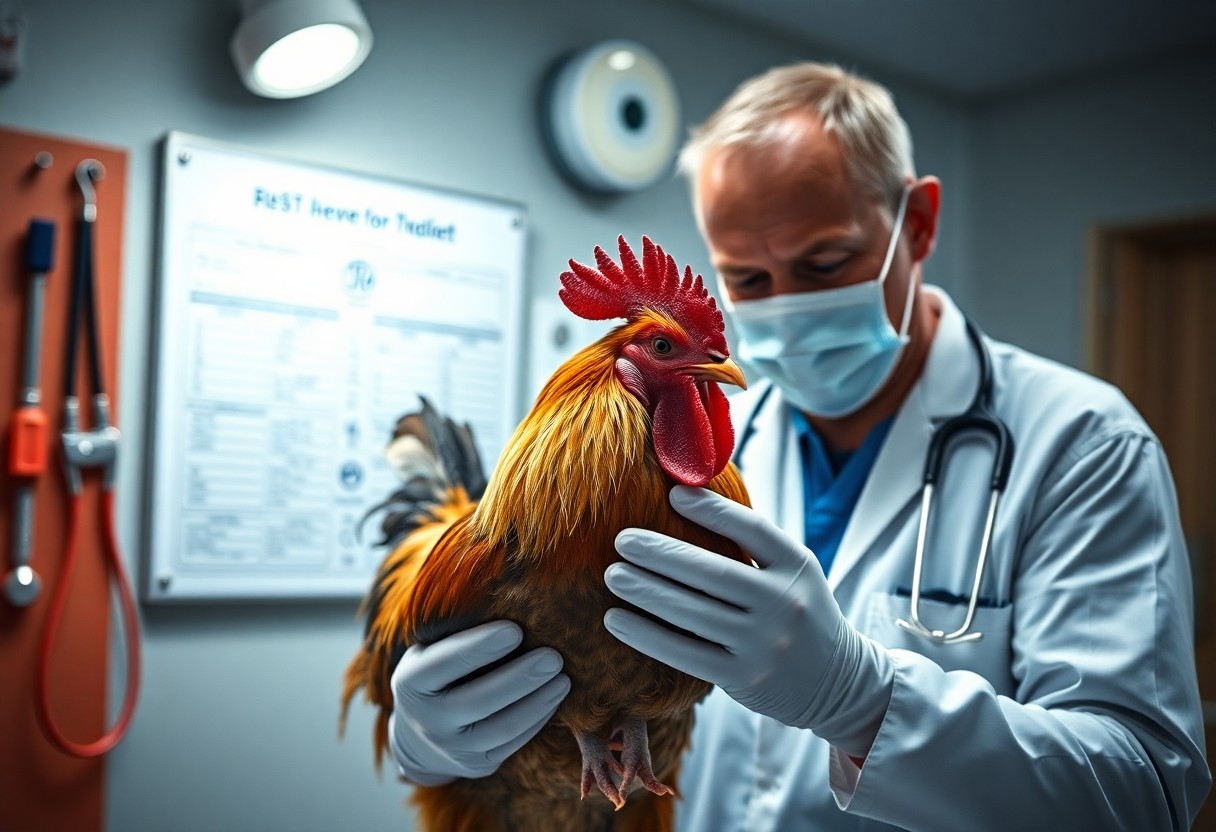
Factors to Consider for Rooster Health
Keep in mind several important factors when assessing your rooster’s health. Regular evaluations should focus on:
- age
- breed
- diet
- environment
- behavior
Thou must ensure each factor is evaluated to maintain optimal health.
Age and Breed Specificity
There’s a significant correlation between a rooster’s age and breed that influences its health needs. Younger chickens generally require different care compared to older ones, while specific breeds have unique predispositions to certain health issues. Understanding these nuances helps you tailor your health checks for better outcomes.
Environmental Influences
Clearly, the environment plays a vital role in your rooster’s well-being. Factors such as temperature, space, and hygiene can greatly impact their health. A clean, spacious coop with proper ventilation is imperative for preventing diseases, while extreme weather can affect your rooster’s overall condition.
To maintain healthy roosters, be vigilant about your environmental factors. Provide adequate ventilation to prevent respiratory issues, ensuring that the coop conditions are compliant with the ideal temperature for your birds. Regularly clean your rooster’s living space to reduce the risk of infections and pests. Additionally, ensure they have access to outdoor foraging spaces to promote natural behaviors, which enhances their physical health and overall quality of life.
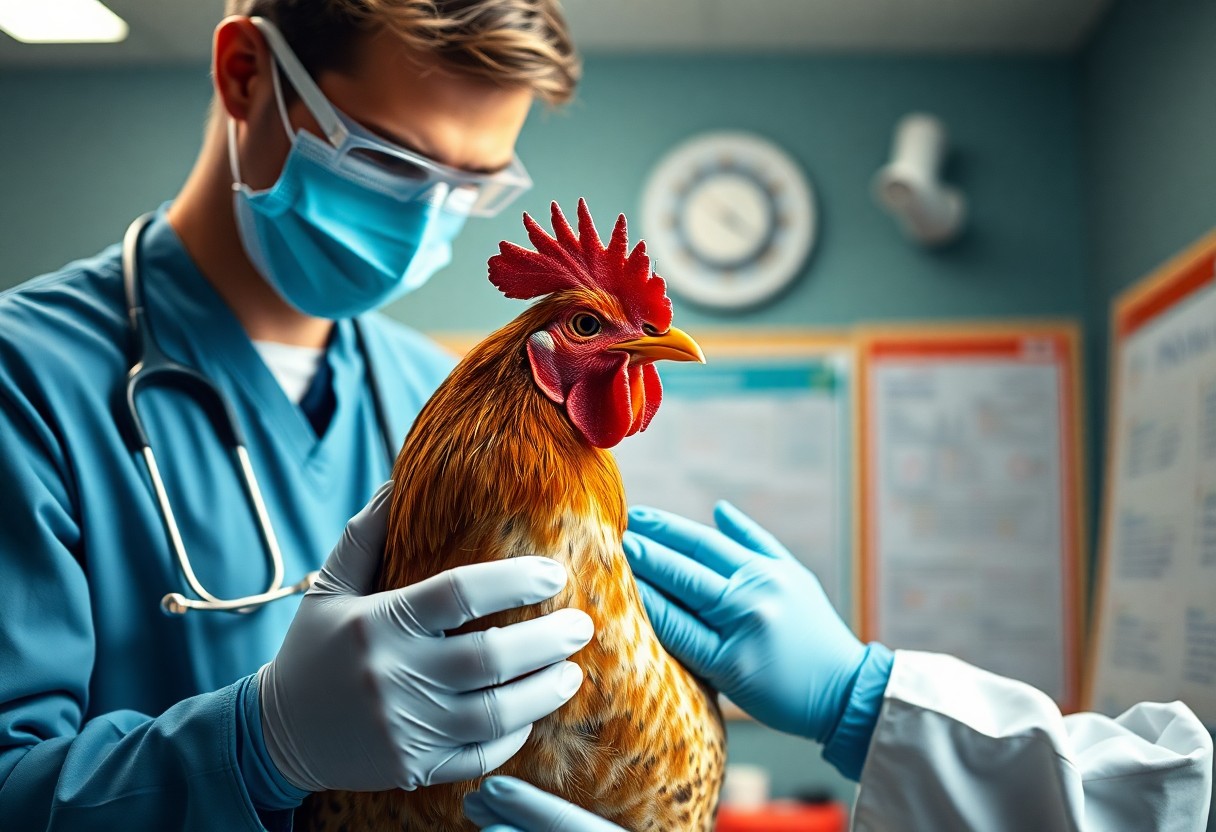
Tips for Maintaining Rooster Health
After ensuring your rooster receives regular check-ups, focus on these necessary tips for maintaining strong health:
- Provide a balanced diet.
- Ensure proper hydration.
- Maintain a clean living environment.
- Monitor for signs of illness.
- Engage in regular social interaction.
Your commitment to these practices will lead to a happier and healthier rooster. Any attention to detail can make a significant difference in their overall well-being.
Nutrition and Diet
Health is deeply influenced by the quality of your rooster’s diet. Offering a varied diet that includes high-quality feed, grains, and fresh vegetables will promote optimal growth and vitality. Consider supplementing with protein sources to support egg production and overall energy levels. Ensuring your rooster maintains a balanced and nutritious diet is key to fostering robust health.
Habitat and Living Conditions
Living conditions significantly affect your rooster’s health and happiness. You must provide a safe, clean, and spacious environment that protects them from predators and harsh weather. Regularly clean their living area to prevent disease and keep their habitat well-ventilated. Ensure that they have access to clean water and natural sunlight, which is necessary for their well-being.
Understanding the habitat needs of your rooster is necessary to their overall health. They thrive in a well-ventilated, dry area with plenty of space to move around freely. A clean environment reduces the risk of disease and promotes mental well-being. Consider providing perches, nesting boxes, and safe, enrichment activities to keep them active and engaged. Ensuring that their living conditions are secure from predators is also vital for their safety and peace of mind. These factors play an integral role in maintaining your rooster’s physical and emotional health.
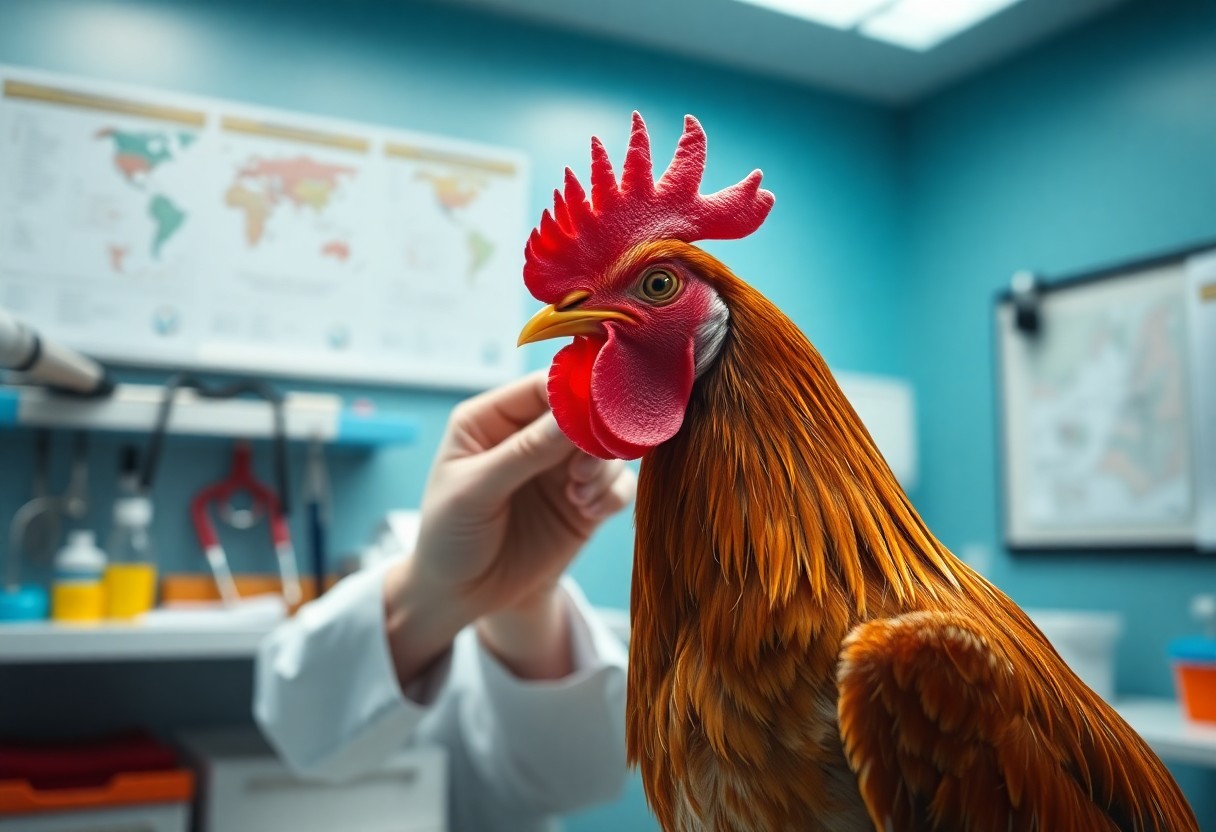
Pros and Cons of Regular Health Check-Ups
Not all aspects of regular health check-ups for your rooster are black and white. Understanding the benefits and downsides can help you make an informed decision for your flock. Here’s a breakdown of pros and cons:
| Pros | Cons |
|---|---|
| Early detection of health issues | Costs associated with vet visits |
| Improved overall flock health | Potential stress for birds during exams |
| Access to professional advice | Time-consuming scheduling |
| Peace of mind for owners | May require follow-up treatments |
| Prevention of disease spread | Limited availability of avian vets |
Benefits of Early Detection
Regular health check-ups can lead to early detection of potential health problems in your rooster. By identifying issues sooner, you can implement treatment plans that will promote better health outcomes. Effective intervention can significantly reduce the risk of severe illness and enhance the quality of life for your birds.
Potential Challenges and Considerations
Early interventions can be beneficial, but there are some factors to consider. Regular check-ups may pose financial burdens due to ongoing veterinary costs. Additionally, the process can introduce stress for the rooster, impacting their immediate well-being. Scheduling appointments might also interfere with your daily routine, and there is a possibility that the vet may suggest further treatments or tests. It’s imperative to weigh these considerations against the benefits to ensure a balanced approach to your rooster’s health care.
To mitigate potential challenges, you can plan your check-ups during quieter times in your schedule to minimize disruptions. Budgeting for veterinary care can help avoid financial strain while ensuring your birds receive the necessary attention. Choosing a vet experienced in avian care can further reduce stress levels for your rooster. Overall, being prepared for these considerations while emphasizing their health and comfort will create a more productive environment for your flock.
Common Health Issues in Roosters
Unlike hens, roosters can face specific health issues that may often go unnoticed if not regularly assessed. Common problems include respiratory infections, mites, and reproductive disorders. These conditions can have significant impacts on their overall well-being, making it important for you to stay vigilant and proactive about your rooster’s health. Early detection through regular health check-ups can lead to better outcomes and a happier, more vibrant flock.
Recognizing Symptoms
If you notice your rooster exhibiting unusual behaviors such as lethargy, a change in appetite, or abnormal vocalizations, these may be signs of underlying health issues. Additionally, watch for physical symptoms such as swelling, discharge from the eyes or nostrils, and changes in feather quality. Being observant can help you identify problems early and seek appropriate treatment.
Treatment Options
Recognizing health issues in your rooster opens the door to effective treatment options tailored to their specific condition. If your bird is diagnosed with a respiratory infection, for instance, your veterinarian may recommend antibiotics or supportive care. For external parasites like mites, specific treatments are available to eliminate infestations. You should also ensure a stress-free environment, proper nutrition, and optimal living conditions to support your rooster’s recovery.
Plus, establishing a good relationship with a veterinarian experienced in poultry can provide you with important guidance and a clear understanding of treatment protocols. Early interventions may involve administering medication, adjusting your rooster’s diet, or implementing preventive measures to ward off common ailments. With the right care and attention, you can help ensure your rooster stays healthy and prosperous in your flock.
To wrap up
With these considerations in mind, prioritizing regular health check-ups for your rooster is crucial for ensuring their well-being and optimizing their productivity. By staying proactive in monitoring your flock’s health, you can detect potential issues early, maintain a healthy environment, and enhance the overall quality of your roosters. Implementing a routine of check-ups not only safeguards your birds but also contributes to a thriving poultry operation, enabling you to enjoy the benefits of healthy, vibrant roosters.
Q: Why are regular health check-ups important for roosters?
A: Regular health check-ups for roosters are crucial to ensure their overall well-being and performance. These check-ups help in early detection of any health issues, which may include respiratory problems, infections, or parasites. It is during these evaluations that a vet can recommend appropriate vaccinations and nutritional adjustments. Regular assessments also contribute to better breeding outcomes by ensuring that roosters are healthy and fit for mating, leading to stronger and healthier offspring.
Q: What specific health issues should I look for during a rooster check-up?
A: During a rooster health check-up, several specific issues should be assessed. First, observe their weight and body condition, noting any significant weight loss or gain, which could indicate underlying problems. Check for signs of respiratory distress such as wheezing or coughing, as these can signal infections. Examining the feathers for any signs of abnormal loss or pests like mites is also crucial. Additionally, a physical examination should include assessing the rooster’s eyes, beak, and feet for signs of disease or injury. Regular fecal exams may be advisable to rule out internal parasites as well.
Q: How often should I schedule health check-ups for my rooster?
A: It is generally recommended to schedule health check-ups for your rooster at least once a year. However, if your rooster participates in shows, breeding, or if you notice any unusual behavior or signs of illness, more frequent visits may be beneficial. Young roosters, those newly introduced to a flock, or older roosters may also require more regular monitoring. Consulting with your veterinarian can help determine the best schedule based on your rooster’s specific needs and lifestyle.
